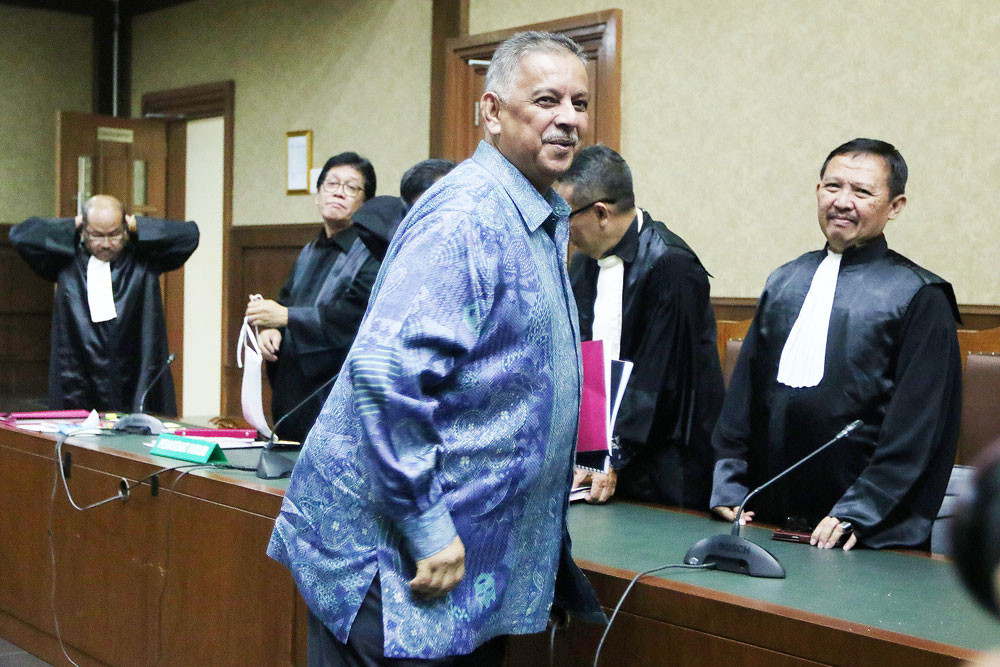Popular Reads
Top Results
Can't find what you're looking for?
View all search resultsPopular Reads
Top Results
Can't find what you're looking for?
View all search resultsAnticorruption fight at risk as Supreme Court acquits another high-profile graft defendant
Change text size
Gift Premium Articles
to Anyone
 Standing tall: The former president director of state-owned electricity company PLN, Sofyan Basir, attends a hearing at the Jakarta Corruption Court last year. Sofyan had been indicted on corruption charges involving the construction of a power plant in Riau but was found not guilty, a verdict that has been upheld by the Supreme Court. (The Jakarta Post/Dhoni Setiawan)
Standing tall: The former president director of state-owned electricity company PLN, Sofyan Basir, attends a hearing at the Jakarta Corruption Court last year. Sofyan had been indicted on corruption charges involving the construction of a power plant in Riau but was found not guilty, a verdict that has been upheld by the Supreme Court. (The Jakarta Post/Dhoni Setiawan)
T
he Corruption Eradication Commission (KPK) has once again hit a wall in its fight against corruption after the Supreme Court upheld the acquittal of the former head of state-run electricity company PLN, Sofyan Basir, the latest graft suspect to evade conviction.
His acquittal was formalized in a court ruling dated June 16, in which the Supreme Court rejected the KPK’s appeal against a not-guilty verdict handed down by the Jakarta Corruption Court last year.
Previously, KPK investigators detained the former PLN president director for allegedly receiving bribes in relation to a coal-fired power plant (PLTU) project in Riau province.
While the KPK claimed that the supporting evidence gathered was sufficient to prove Sofyan’s involvement, the court insisted that the Jakarta Corruption Court’s prior decision was the correct one.
Activists have lambasted the court ruling, saying it poses a new threat to anticorruption efforts, given that it was not the first time that a major graft suspect had been cleared of wrongdoing by the courts.
Last year, the Supreme Court acquitted former Indonesian Bank Restructuring Agency (IBRA) chairman Syafruddin Arsyad Temenggung, the man at the center of the Bank Indonesia Liquidity Support (BLBI) scandal, of corruption charges.
At the time, the court granted an appeal filed by Syafruddin to overturn a lower court’s decision to sentence him to 15 years in prison with a fine of Rp 1 billion (US$70,736) for his role in the multimillion-dollar graft case.
“The court’s action [of granting acquittals to graft suspects] has rendered antigraft efforts by law enforcement agencies futile,” said Kurnia Ramadhana of Indonesia Corruption Watch (ICW).
Supreme Court spokesperson Andi Samsan Nganro declined to comment, saying only that the court’s decision to reject the KPK’s appeal against Sofyan’s acquittal was based on evidence presented in the trial. “Everything was based on the facts,” Andi said.
Kurnia claimed on Thursday that the decision to clear Sofyan of the charges only served to exacerbate the lack of commitment to the fight against corruption, confirming an ICW report finding.
The April report on court ruling trends recorded that Indonesia’s lower and higher courts handed down not-guilty verdicts on 41 graft suspects in 2019, almost double the 2018 figure.
The antigraft watchdog also found that the courts had “let off” 13 defendants, meaning that they were guilty of wrongdoing but the act that they were accused of could not be considered criminal.
“Expect fewer successful corruption cases in the future if the court keeps granting acquittals, because graft offenders will find it easy to dodge charges laid against them,” he told The Jakarta Post.
Indonesia had been gradually improving its standing in the fight against corruption, but the tables have turned since efforts to defang the antigraft body began last year.
Indonesia scored 40 out of 100 in Transparency International’s 2019 Corruption Perception Index, its highest since 2012, but a score below 50 is still an indicator of serious corruption.
Zaenur Rohman, a researcher at Gadjah Mada University’s Center for Anticorruption Studies (Pukat UGM), said that while the public must respect every decision the courts make, the growing number of acquittals had begun to form a trend, leading him to question the integrity of court judges.
For Transparency International Indonesia researcher Wawan Suyatmiko, the increase in acquittals has already crushed public faith in the court system as a partner of the KPK in the war against corruption.
Wawan said there was a need for more court justices like Artidjo Alkostar to restore the public's faith in the courts.
Artidjo, now a member of the KPK’s oversight body, was a former Supreme Court justice known for his no-nonsense demeanor and clean track record.
He made graft convicts think twice before lodging an appeal, as he would often give them harsher sentences than their initial verdicts.
Previously, activists have suggested that the court arrange a set of guidelines for judges to follow when handling corruption cases, so as to restore trust in the court system.
KPK spokesman Ali Fikri said the antigraft body would respect all rulings issued by a court, even though they appeared to undermine its anticorruption efforts.
“We always promptly review every court ruling, hoping that there will be leeway for us to legally challenge them. That’s how law enforcement works in the country,” Ali said.









